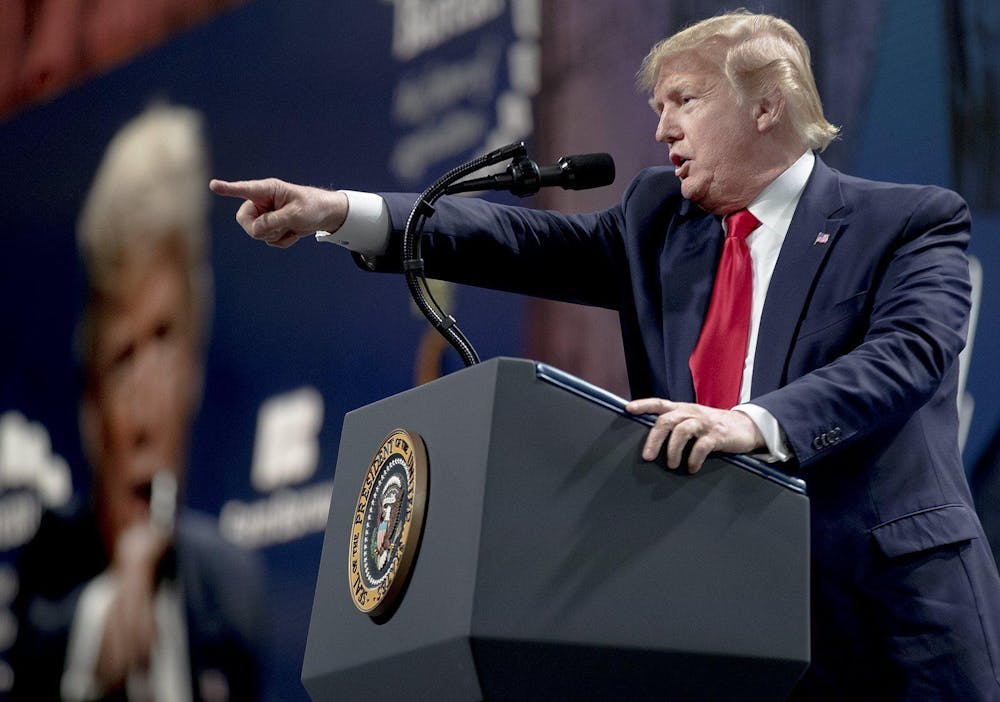Just moments after being impeached by the House of Representatives on counts of abuse of power and obstruction of Congress, PresidentDonald Trump seemed to deny the historic weight of the moment as he spoke at a campaign rally in Michigan.
“By the way," he said, "it doesn’t really feel like we’re being impeached.”
The president’s blithe response demonstrates his unwavering confidence that his base will continue to support him, regardless of his impeachment or the looming question of removal.
Trump’s confidence is not entirely unfounded. His approval among Republicans has largely remained unchanged over the past three years, with Gallup finding his lowest Republican approval rating at 77%.
The contentious nature of Trump’s impeachment, particularly his Senate trial, comes from the impeachment's divisive partisanship. According to PBS polls, both support and opposition for Trump’s removal from office has hovered around 48% since October. By party, 85% of Democrats support removal and 92% of Republicans oppose it.
Trump will probably be acquitted by the Senate and remain in office. However, we should still pay attention to how the trial is run and any revelations that come from it. Aside from the actual verdict, there is serious constitutional importance in the procedure of the trial and whether the Senate will sincerely keep the executive in check or not by holding him responsible for future grievances. Additionally, information revealed during the trial might influence undecided voters even if the senators are not convincedto remove the president.
The president has incessantly attempted to invalidate the impeachment process by calling it a partisan witch hunt before it even began, even calling for Republican senators to dismiss the trial outright. Unfortunately for Trump, House Speaker Nancy Pelosi’s decision to hold the articles of impeachment to negotiate trial rules with Senate Majority Leader Mitch McConnell seem to have paid off.
Announced late Monday by McConnell, the trial started Tuesday with two days of opening arguments for both the prosecution and defense. After arguments are made, senators will have 16 hours to question each side and four hours to debate.
The question of whether witnesses will be allowed to testify and how many is still undecided. Democrats have been vocal about allowing witness testimony from individuals such as former national security adviser John Bolton and businessman Lev Parnas, an associate of Rudy Giuliani.
“All of this continues to underscore the need for witnesses and documents,” says Colorado Representative Jason Crow on Parnas’ recent reveal that Trump halted Ukraine military aid and his involvement with Ukraine Ambassador Marie Yovanovitch’s dismissal.
It seems as though most Republican senators will still vote to acquit the president.
Even if the Senate votes to remove the President in some sort of plot twist, I fear Trump will still come out on top. As his approval ratings seem to indicate, President Trump can do no wrong in the eyes of the GOP. As the New York Times wrote, his demand for loyalty either quiets Republican critics or forces them out of the spotlight.
Regardless of the President’s fate in the Senate trial, his base will likely ardently defend him. If he’s acquitted, his actions are vindicated and he clearly did nothing wrong. If he is somehow convicted, he becomes a martyr persecuted by radical Democrats and disloyal Republicans.
What’s the point, then? If new evidence, testimony and hours of oral argument and debate won’t change anything, what’s the point of caring and insisting on such a drawn-out process?
The process is the point. From the evidence shown during the House impeachment proceedings, it appears the president committed impeachable offenses. Regardless of what political repercussions may follow, it is the constitutional duty of Congress to check the president’s apparent abuses of power.
As with Presidents Andrew Johnson and Bill Clinton, there are likely not enough senators willing to remove the president. Still, it’s vital that we insist on protecting the Constitution’s procedure. The Senate may not vote to remove the president, but revelations from this trial might just bring the American people to remove him themselves this November.
Everett Kalman (he/him) is a junior studying law and public policy. He plans on practicing immigration law in the future.





